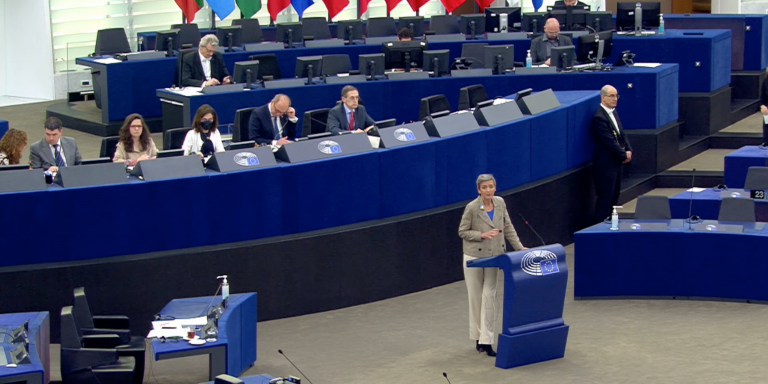
This Tuesday, May 3, the European Parliament adopted the final recommendations of its special committee on artificial intelligence in the digital age (AIDA). The MEPs highlighted that the use of artificial intelligence has enormous advantages in dealing with the problems of climate change, pandemics and the labor market. They also warned of the risks posed to fundamental rights, including privacy.
AIDA’s final recommendations were adopted by 495 votes in favor, 34 against and 102 abstentions in the European Parliament.
The AIDA Committee and the next steps
The Special Committee on Artificial Intelligence in the Digital Age began its activities in September 2020. In its mandate, it was tasked with analyzing the impact of AI on the EU economy and its different sectors, analyzing the strategy of third countries towards AI, and charting the way forward. The commission held a number of hearings and debates to contribute to its final report, which aims to establish an AI roadmap to 2030.
The report will feed into upcoming parliamentary work on AI, in particular AI legislation currently being considered by the Internal Market and Consumer Protection (IMCO) and Civil Liberties, Justice and Home Affairs (LIBE) committees. The AI legislation is scheduled for a joint vote by the two committees at the end of September.
Re-launching in the race for global technological supremacy
The text states that the public debate on the use of AI should focus on its enormous potential to complement human work. It indicates that the EU is lagging behind in the race for global technological supremacy. As a result, it risks seeing the next AI standards developed abroad, often by undemocratic actors. Yet the EU must act as a global reference on this subject, say MEPs.
AIDA Committee Chairman Dragoș Tudorache said:
“Our future competitiveness in the digital sector depends on the rules we develop today. These rules must be in line with our values: democracy, the rule of law, fundamental rights and respect for the rule-based international order.
It is essential that we do this, as the gap between authoritarianism and democracy continues to grow, taking more and more lives with it, as we see with Russia’s unjustified invasion of Ukraine.”
The MEPs identified several policy options that could unlock the potential of AI in health, the environment and climate change. In addition, the technology could help fight pandemics and global hunger as well as improve the quality of life of citizens via the creation of personalized medicines. According to MEPs, if combined with the necessary support for infrastructure, education and training, AI can also increase the productivity of capital and labor, contribute to innovation, lead to sustainable growth and create jobs.
The EU should not regulate AI as a technology, say MEPs, and the level of regulatory intervention should be proportionate to the type of risk involved in using an AI system.
Risk of mass surveillance
While acknowledging the EU’s willingness to forge a global agreement on common standards to ensure the responsible use of AI, MEPs call on like-minded democracies to work together to address this challenge on an international scale. They also point out that AI technologies could raise important ethical and legal questions, raising concerns about military research and technological advances in autonomous lethal weapons systems.
Rapporteur Axel Voss stated:
“With this report, we clearly demonstrate that AI will drive digitization and be a game changer in the global race to digitize. In this respect, our AI roadmap puts the EU in pole position.
Now, the EU must take advantage of this unique opportunity to put forward a trusted, human-centric approach to AI; one that is based on fundamental rights, that controls the risks while fully leveraging the benefits that AI brings to society as a whole. We need both an open regulatory framework for innovation and a harmonized digital single market with clear standards, as well as maximum investment and a sustainable digital infrastructure accessible to all citizens.”
Furthermore, Parliament observes that some AI technologies allow for the automation of information processing on an unprecedented scale, paving the way for mass surveillance and other illegal interference with fundamental rights. As such, MEPs warn that many authoritarian regimes could use AI to control, conduct mass surveillance, categorize their citizens and restrict their freedom of movement, while dominant technology platforms use AI to obtain more personal information about their users. For MEPs, this use of profiling presents a danger to democratic systems.
Therefore, according to Parliament, the EU should prioritize international cooperation with like-minded partners to protect fundamental rights while cooperating to mitigate new technological risks.
Translated from Le Parlement européen adopte les recommandations de sa commission spéciale sur l’intelligence artificielle









